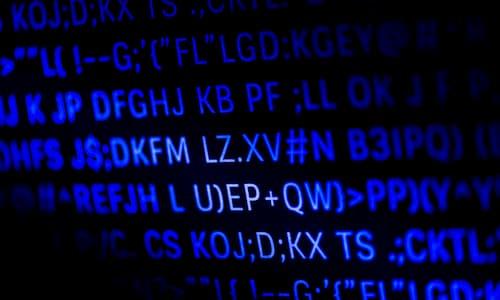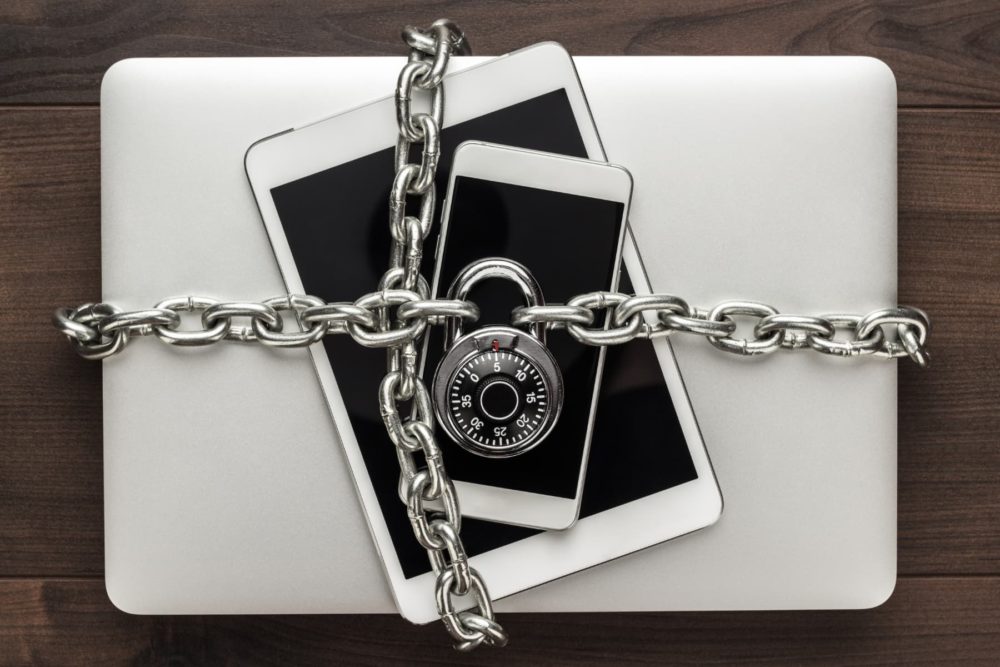Today information is the lifeblood of business. It travels at the click of a mouse or tap of a screen. Data processing is something that touches nearly every business in practically every industry in almost every corner of the world.
That being said, data security, or information security, is a huge consideration and something that must be taken seriously for businesses to protect themselves, their clients, and their interests.
However, as technology has advanced, so too have criminals. Data thieves are everywhere, and they’re not wearing black leotards dangling from a tightrope suspended from the ceiling trying to steal a hard drive. These criminals work around the clock from everywhere (sometimes they may even be your own staff) using both digital and physical means to steal sensitive information.
What does this have to do with recycling? One of the most common and straightforward ways for these bad actors to get a hold of sensitive information is via improper disposal of depleted assets. We are GLEC are here to make sure that doesn’t happen and to keep you and your data safe.
What is data security?
It is the process of protecting data and other sensitive information from unauthorized access, theft, and corruption throughout its lifecycle.
Data can take many forms, but regardless of its shape, it is your most valuable asset for several reasons. Today data drives everything in our digital world. Information security is how you protect it.
There are many different tools to protect your data. Read on to find out more!
How To Protect Your Data 101
Depending on the type of data you process as well as the nature of your business, your information security protocols may vary, however, there are still best practices that you should be mindful of and implement in your business.
- Secure
- Back up
- Training
Secure your data
The actual security checks that you have in place to prevent thieves from getting their hands on your data. Security protocols can include the following.
Encryption
Data that has a form of password protection; also called tokening. Data is only accessible or viewable if a particular key is provided.
Erasure
Once you no longer need the collected data, properly erase said information so that it cannot be stolen.
Masking
Masking is only displaying parts of data sets and hiding other components of it, this way the full data set can’t be compromised.
Multi-Factor Authentication
A division of encryption, necessarily requiring more than one form of password or other keys. i.e., not only providing a password but perhaps a type of bio authenticator such as a fingerprint or retinal scan to access information.
Back-Up
Securing your data isn’t only about trying to keep it out of the hands of criminals; it’s also protecting it. Computers crash, disasters happen, viruses, you name it, there are any number of ways that your valuable data can be lost.
For this reason, you should back up your data. Offsite server storage, such as implementing a cloud system is a smart way to back up data.
Less safe and not as recommended as cloud-based storage systems, yet useful nonetheless are physical copies such as flash drives and disks.
Training
As much as technology is vital for information security, the human element is just as, if not more important. An organization can have all the best practices for securing their data that are available, but they mean nothing if staff and other members of the organization fail to follow them.
Organizations must provide regular training so that employees not only understand how necessary these security measures are but also find ways to have staff but in and maintain compliance.
Finally, just as organizations must keep with industry best practices to ensure success in their work and with clients, it is no different with a data security policy. Staying up to date and ensuring that staff members are trained with the most up to date best practices helps to ensure that protocols are followed, and sensitive information is protected.

Most at Risk
While any organization that handles data is technically at risk for data theft, the group that may be most at risk, aside from the financial industry, is the medical industry. Medical records are highly sought after by cybercriminals, especially since there is such a variety of information that can be obtained.
According to Formassembly.com, on the dark web, medical records can cost up to $60 per asset. That may not sound expensive on its own, but when you consider the sheer volume of medical records that exist, the number is vast.
If your business exists in the medical field, be sure to follow all Health Insurance Portability and Accountability Act (HIPAA). Three of the major tenets of HIPAA include provisions to reduce health care fraud and abuse, mandate industry-wide standards for health care information on electronic billing and other processes, and requiring the protection and confidential handling of protected health information. For more information regarding HIPAA regulations, you can visit the U.S. Department of Health and Human Services.
Why is a Data Security Policy Necessary?
According to ConsumerAffaris.com, in 2018, the Federal Trade Commission processed 1.4 million fraud reports totaling $1.48 billion in losses. The same organization reports that as far as interconnected and data sharing devices are concerned, there are an average of 5,233 attacks per month.
What does this mean for you and your organization? It means that you have to be careful. In the event of a data breach, you and your company can be held liable for any losses clients and others incur.
The United States does not currently have a national standard regarding information security, unlike the European Union. The EU follows the General Data Protection Regulation (GDPR), which lays out data security policy standards and management for EU member countries (if your business does a lot of work in the EU, you will have to conduct yourself under these laws).
Data Disposal
One of the best opportunities for cybercriminals to acquire data is during the disposal process. If old tech assets aren’t properly disposed of, it creates an opening for these cybercriminals to swipe your old products and get what’s on them.
Before you try to dispose of any tech assets, you should be sure that you have wiped all data from each device. This can be done in a variety of ways, such as disk clearing and degaussing.
At the end of the day, however, electronics shouldn’t go to the dump, destroying the data in your computers and other hardware doesn’t mean that they can now be disposed of in the trash with other waste. It only protects your information from would-be hackers and data thieves; now, your materials are ready to be recycled properly. This is especially important in healthcare.

Hardware Disposal
Aside from the environmental aspects of disposing of e-waste in the trash with other materials, the data breach aspect is another considerable problem, and it happens more than you think. It’s a growing problem that’s only getting worse.
In fact, because of this, there are at least 35 states and Puerto Rico that have enacted business e-waste laws, according to the National Conference of State Legislatures. These laws require private or municipal entities to destroy their data entirely. If you don’t prepare and recycle your unwanted and old tech hardware, you can be held legally responsible for data and privacy breaches.
Each organization should have its data plan to deal with IT equipment and data that is no longer needed. The “out with the old and in with the new” is what drives business in terms of technology.
However, disposal of assets and data responsibly, safely and in an environmentally friendly way should be a significant concern as well.
Need Help?
If you haven’t realized it by now, you can’t just dispose of your unwanted IT assets willy-nilly; they have to be prepared for disposal through sanitation or destruction. You shouldn’t and in some cases can’t just throw old tech into the trash.
In our modern, technology-driven world, business electronics can cause as many problems as they can help with. If you want assistance with liability reduction and the entire tech data recycling process, we’re here to help.
Here at Great Lakes Electronics Corporation, we will assist you in the processing and recycling step of your hardware asset management process to ensure a proper, environmentally-friendly, and secure flow.
To learn more about our services or contact us to start a collection process, contact us here. For more information about E-waste and recycling, visit our blog.
If you haven’t realized it by now, you can’t just dispose of your unwanted IT assets willy-nilly; they have to be prepared for disposal through sanitation or destruction. You shouldn’t and in some cases can’t just throw old tech into the trash.
In our modern, technology-driven world, business electronics can cause as many problems as they can help with. If you want assistance with liability reduction and the entire tech data recycling process, we’re here to help.
Here at Great Lakes Electronics Corporation, we will assist you in the processing and recycling step of your hardware asset management process to ensure a proper, environmentally-friendly, and secure flow.
To learn more about our services or get in touch to start a collection process, contact us here. For more information about E-waste and recycling, visit our blog.

